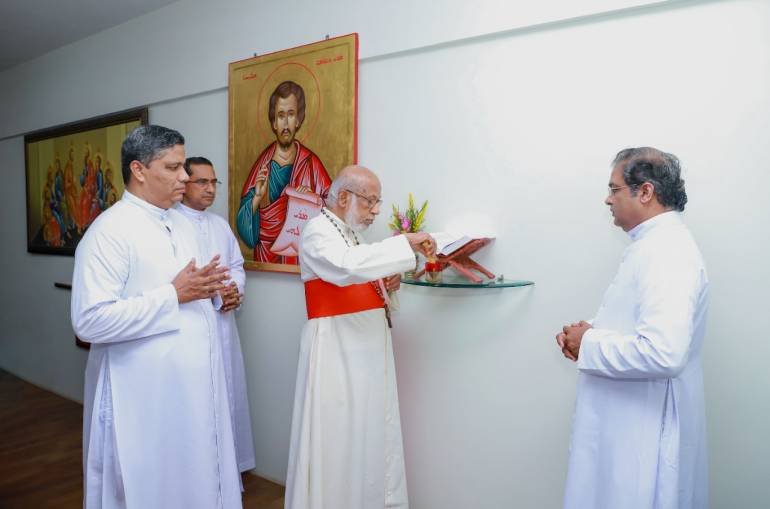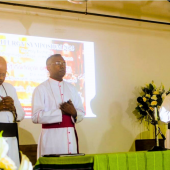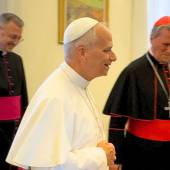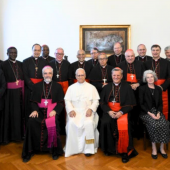Syro-Malabar Church Synod of Bishops opens in Kochi, India

The second session of the 30th Synod of the Syro-Malabar Church started in Kochi, Kerala in South India, on August 16. This session of the Synod will last for two weeks.
The Synod opened with Eucharistic celebration presided over by Mar George Cardinal Alencherry, the Major Archbishop. Later in the afternoon, the Major Archbishop Inaugurated the Synodal sessions by lighting the lamp, symbolically invoking the presence of God.
In his inaugural address, Cardinal Alencherry gave an overview of the recent events of importance for the Syro-Malabar Church.
He recalled especially the celebrations in connection with the 1950th anniversary of the martyrdom of St. Thomas the Apostle, the Father of the Syro-Malabar Church.
He drew attention to the various problems faced by the faithful, especially the farmers in the High Ranges (hilly areas) and the fishermen in the coastal regions, both mostly Christians. Certain Government policies in recent years, declaring these areas as ecologically sensitive without compensating the farmers, have adversely affected the farmers and the fishermen.
Cardinal Alencherry ended his inaugural speech quoting the words of Pope Francis that the Holy Spirit is the wind, the sail and the hope pushing the Church and Synod forward.
This two-week-long session of the Syro-Malabar Synod will discuss various matters pertaining to the Church, including the revision of the priestly formation program and the Synodal path for the Church.
The Syro-Malabar Church Synod
The Syro-Malabar Church Synod is the Assembly of all the Bishops of the Syro-Malabar Church, headed by the Major Archbishop. It is the supreme authority of a Church, as the legislature, superior tribunal and the electoral college of a particular Church.
Church Synod of the Eastern Churches is different from the Synod of Bishops in Rome.
Permanent Synod is the organ forming part of the Major Archiepiscopal Curia, constituted for a five-year term to help the Major Archbishop in matters of ordinary administration or in expediting urgent affairs. The permanent Synod consists of five Bishops of the Syro-Malabar Church and the Major Archbishop as its President.
The Major Archiepiscopal Curia is the administrative headquarters and the central governing body of the Syro-Malabar Major Archiepiscopal Church. The Major Archiepiscopal Curia coordinates and provides central organization for the correct functioning of the entire Syro-Malabar Church. It consists of the Major Archbishop, the Permanent Synod and the Synod of Bishops, the Curia Bishop, the Chancellor and the various departments like the Chancery, Financial Office, Tribunals and various Commissions.
The Syro-Malabar Church Today
The Syro-Malabar Catholic Church is one of the 22 Eastern (Oriental) Catholic Churches in full communion with Rome. It is the largest Eastern Catholic Church after the Ukrainian Church and the largest of Saint Thomas Christian (Nazrani) denominations with 5 million believers. It is a sui juris Church governed by the Synod of Bishops headed by the Major Archbishop. The other two Catholic Churches in India are the Latin Church and the Syro-Malankara Church.
Syro-Malabar Church has over 5 million faithful worldwide, with 5 Archdioceses and 13 dioceses in Kerala, South India, 13 mission dioceses in India and outside Kerala, and 4 dioceses for migrant faithful outside India.
There are 64 Bishops, over 8000 priests, both diocesan and religious together, and over 32,00 women religious and 1200 major seminarians.
The Syro-Malabar Church is very actively involved in educational, social and health-related fields. The Syro-Malabar Church runs 4860 educational, 262 ecclesiastical, and 2600 health and charitable institutions. The corporate contribution of the Syro-Malabar Church to nation-building in India is inestimable.
The Syro-Malabar Church, with its deep-rooted spirituality and high rate of vocations to the priesthood and religious life, can be considered the most vibrant Catholic community in the world.
Radio Veritas Asia (RVA), a media platform of the Catholic Church, aims to share Christ. RVA started in 1969 as a continental Catholic radio station to serve Asian countries in their respective local language, thus earning the tag “the Voice of Asian Christianity.” Responding to the emerging context, RVA embraced media platforms to connect with the global Asian audience via its 21 language websites and various social media platforms.














